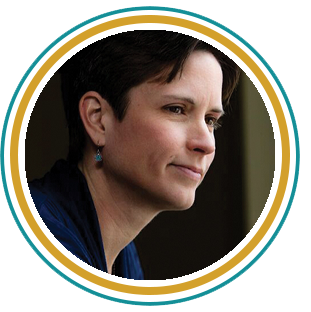I must start with a confession: Encouraging others is very difficult for me. I’m not 100 percent sure why, but when someone I know accomplishes something great—especially in my own areas of perceived expertise—my natural instinct is not to immediately celebrate them. My natural instinct is to withhold. When someone expresses a view that’s different from mine, my natural instinct is not to lean in and seek to understand but to become further entrenched in my own view and dismissive of theirs. I am apt to cease to listen or offer the benefit of the doubt, even though I’d never say so in the moment.
This less-than-great trait of mine is particularly pronounced when I’m feeling fear and anxiety. I begin to compare myself, my abilities, my family, and my accomplishments with those of others. And, this is the really hard part to share: in this fear and anxiety of not being good enough, I elevate myself above others and take a position of superiority instead of humility.
I’m ashamed to share all this, and I’m still working through possible causes (and solutions). Two conditions I have identified, though, include a scarcity mind-set and a stingy heart. Somehow I have come to fear that there is only so much good to go around. So, if a friend receives accolades on her writing, I sense that I cannot. I don’t think there are enough accolades in the world for me if someone else receives them. And if anyone does receive accolades, it should be me, not someone else. I don’t believe any of this crosses my mind consciously, but it’s there.
Cultivating a Spirit of Generosity
I want to hide this lack of generosity of spirit in myself. It really bothers me. Yet it’s my default mode—and at least one of the reasons I need to practice encouragement as a discipline. In some ways, I’m a product of our culture (scarcity mind-set) and in other ways I’m just human (stingy heart).
The idea of building up others has become increasingly foreign in our culture. Our world is becoming more and more self-focused, image-obsessed, and willing to cancel anyone who makes even the slightest mistake.
Tweet
Until I became a Christian, encouragement wasn’t a concept I really ran into much. I’ve been encouraged in my life at various points by parents and teachers for sure, but encouragement as a gift one can practice and get better at is a newer thought for me. And I don’t think I’m the only one. The idea of building up others has become increasingly foreign in our culture. Our world is becoming more and more self-focused, image-obsessed, and willing to cancel anyone who makes even the slightest mistake.
Embrace Justice—and Redemption
Good values underlie cancel culture in its purest form—justice for the injured and accountability for those who hurt. And social media has allowed individuals with no power to rely on themselves instead of the government or organizations to call the powerful to account. Several sex predators have been caught and stopped due to a call for accountability on social media. These are all good things. But we can take it too far. We are so practiced at judging, condemning, and punishing.
Rare are the news stories of redemption and restoration. In fact, rare are the news stories in which redemption or restoration is even an option. The public social-media arena has become the Roman Colosseum, where lions rush in to kill and destroy, and you are given a thumbs up or thumbs down by a collective that knows little, if anything, about you. Whatever wrongs an offender has committed must be exposed; they should no longer receive support or have jobs or a platform for their ideas or talents. Second chances and redemption are not in view. Cancel culture leaves no room for the notion that people can change. It assumes that anyone who says or does something that offends must forever be defined by those words or actions.
Cancel culture leaves no room for the notion that people can change. It assumes that anyone who says or does something that offends must forever be defined by those words or actions.
Tweet
We must take care not to simply destroy individuals and reduce them to an ideology. It separates them from the body (or members from the community) and tells them they are no longer wanted, no longer valued. What happens when someone says something “offensive” in a post-church coffee connect? Does that congregant get cancelled? Do entire groups of people get cancelled from certain churches because they hold opinions or say things that others find offensive, insensitive, uncomfortable, or contrary to their views? Or does the church embrace them, listen to their stories, and lead them with gentleness to Jesus Christ? Do Christians build up with love and in love, or do they tear down with judgment and condemnation?
Paul’s words in his letter to the Roman churches—churches that were filled with people of different backgrounds and statuses—makes me think that what we deal with today has been happening for a long time:
Love from the center of who you are; don’t fake it. Run for dear life from evil; hold on for dear life to good. Be good friends who love deeply; practice playing second fiddle. . . . Bless your enemies; no cursing under your breath. Laugh with your happy friends when they’re happy; share tears when they’re down. Get along with each other; don’t be stuck-up. Make friends with nobodies; don’t be the great somebody. Don’t hit back; discover beauty in everyone. If you’ve got it in you, get along with everybody. Don’t insist on getting even; that’s not for you to do. “I’ll do the judging,” says God. “I’ll take care of it.” Our Scriptures tell us that if you see your enemy hungry, go buy that person lunch, or if he’s thirsty, get him a drink. Your generosity will surprise him with goodness. Don’t let evil get the best of you; get the best of evil by doing good. ROMANS 12:9-21, MSG
Oh, how we need people who will live this way. Instead of building each other up, we tear each other down. All of this has found its way into the church. So how do we instead become people of encouragement?
Encouragement as a Discipline
We can tend to think of encouragement as saying a word here or there to a friend or colleague to spur them on in their personal or work pursuits. Maybe you, like me, have thought of encouragement as a somewhat insubstantial gift—like a compliment from your mom or grandmother. You know what I mean: When they tell us something was great, we take it with a grain of salt because, well, they’re our moms or grandmas. They almost have to say nice stuff.
In actuality, encouragement takes great discipline and intention because it is no less than being Christ to one another. Encouragement is a “total commitment to be God’s instrument in other people’s lives.”[i] It is honoring others above ourselves. It is placing our needs beneath the needs of others. It is being fully present to one another. It is foregoing our need to be seen and known so that another can be seen and known. It is allowing thoughts and feelings of ours to go unexpressed for the good of others. It is withholding opinions and our desire to be right. It is getting out of ourselves and becoming more interested in someone else. It is a “conscious commitment to promote other people’s welfare.”[ii]
In actuality, encouragement takes great discipline and intention because it is no less than being Christ to one another.
Tweet
As Christians, we have been set apart and equipped by the Spirit to act different from the culture around us—not to conform, as Paul would say, to the patterns of the world (Romans 12:2). This means that we are to go against the grain of cancellation, vilification, and condemnation. We are to withhold our opinions and feelings for the sake of others, even if we think we’re right. We are to think through and discern how to confront injustice and wrongdoing so that even such offenders are treated with honor and love. This is true even if we ourselves will be persecuted as a result. I am convinced that this kind of encouragement is impossible without empathy—and that empathy is what we are really lacking. Only by developing empathy and allowing that empathy to be expressed as encouragement can we redirect ourselves and commit to the values Christ exemplified and taught.
[i] Larry Crabb with Dan Allender, Encouragement: The Unexpected Power of Building Others Up (Grand Rapids, MI: Zondervan, 2013), chap. 5.
[ii] Crabb, Encouragement, chap. 6.




Very wonderful!!
Dear Sister, Thanks for the article. Write an article on Empathy, it will help. Naresh B Jumani, Bangalore, India.
Wonderful, what a great calling,to serve the Lord…
It’s the needed message in todays (technically)connected yet (humanly)disconnected world…I am blessed.I struggle with these and I pray God is working in me.